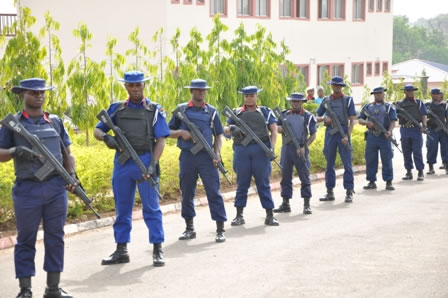There have been consistent calls from different quarters on the Federal Government of Nigeria to sign unto the Voluntary Principles on Security Human Rights, especially amid regular friction between security agents attached to oil companies and members of the oil bearing communities. This has substantially formed the basis of several sensitisations workshops held by a non-governmental organisation,NGO, CLEEN Foundation recently in oil communities of Owaza, Umuorie,and Umuokwor in Ukwa West Local Government of Abia State,Ohaji/Egbema in Imo State.
Voluntary Principles on Security and Human Rights (VPs) are non-binding soft laws established in 2000 to offer guidance to extractive companies(oil,gas and mining companies) in maintaining the safety and security of the facilities and operations with respect for human rights.
The VPs are tripartite multi-stakeholder initiative which participants include 7 states, 11 NGOs, 21 companies and 5 organizations with observer status (as of May 2012).In the work of Dinah L. Shelton of George Washington University Law School (2008),soft laws” usually refer to any written international instrument,other than a treaty,containing principles, norms, standards, or other statements of expected behaviour”.
The positive results produced by sensitisation workshops by CLEEN Foundation in these communities cannot be over-emphasised. Committees to track human rights abuses Umuorie and Owaza communities have been inaugurated. Mr. Ifeanyi Anyanwu, a programme officer of CLEEN Foundation said that the essence of the committees is to track human rights abuses by security agencies attached to oil companies operating within their localities.
He said that the workshop is part of the series of workshops organised by the Foundation aimed at integrating the people of the areas in the extractive activities going on in their environment .He charged the people to start seeing themselves stakeholders and active players in the extractive sector.
Another major highlight of the workshops is that members of the communities are advocating the adoption of community policing to complement the efforts of the police and other security agencies in securing their environments.
The communities in their various resolutions opined that community policing would enhance the security of their communities-lives and property and facilities of the oil companies operating in the areas.
They also maintained that community policing would not only complement the efforts of police but would also help maintain law and order in their communities.
According to the people of Owaza and Umuorie, community policing would only yield positive results when people with proven integrity are recruited.
They further advocated regular interface between the police and operatives of the community police; periodic training of the operatives of the community police by security agencies; and provision of logistics as means of boosting the morale of the operatives.
The committees would be interfacing with CLEEN Foundation periodically to review the reports of the human rights abuses and look for ways of addressing them.
One fundamental assurance that was extracted from CLEEN Foundation at Ohaji/Egbema is that, in liaison with the National Human Rights Commission (NHRS), it would hold periodic meetings with such bodies as the Community Government Council (CGC), Natural Youth Council of Nigeria (NYCN), Niger Delta Youths Council (NDYC), Presidents General (PG) from the CGC, core oil landlords association and Grassroots Development Initiative (GDI) on human rights violation.
Three elements of VPs are Risks Assessment; Interaction with Public Security; and Interaction with Private Security. The Risk Assessment component states that extractive companies should conduct risk assessment at the location/area they intend to carry out operations with a view to mitigating the risk factors. It further stated that companies on an ongoing basis should conduct risk assessment to ascertain security risks and likelihood of human rights abuses.
In the Interaction with Public Security component, the VPs acknowledge that it is he duty of the government to provide security for the protection of lives of property, and ensure human rights are protected. The component explains that extractive companies have an interest to ensure that actions taken by security operatives are in line with the protection and promotion of human rights abuses and promote respect for human rights. The guidelines for this component are security arrangements which states that the extractive companies should consult the host government and communities about the impact of the security arrangements on the host communities; conduct and human rights policies;deployment and conduct; consultation and advice; and record of rights abuses.
In the third component which is interaction with private security, it is noted that since the host government cannot provide adequate security arrangement for the operations of the companies that it may be necessary for the companies to engage the services of private security providers to complement public security with a view that the private security personnel would adhere to the policies on ethical conduct and human rights of the companies.
The potential benefits of VPs are numerous. VPs promote the human rights by ensuring the security arrangement and actions of security personnel do not violate the human rights of the host communities;they encourage communities participation in security arrangement of companies operating in their environment; they contribute to bridging the gap in the relationship between members of the host community and security agents; VPs promote Corporate Social Responsibility (CSR) through regular consultation of the host communities; they encourage proactive measures through risk assessments; and promote accountability and transparency in security arrangement in the extractive industry.
To the stakeholders, through regular consultations, VPs promote peace-building and good relationship among stakeholders in the extractive industry; they provide a good model for addressing security and human rights issues in the extractive industry; they reduce friction and promote conflict prevention among stakeholders in the extractive industry by reducing the risk of human rights violations or abuses;and they enhance better governance of the extractive sector from the security and human rights perspective.
Participants in the VPs initiative include governments such as Australia, Canada,The Netherlands,Norway,
Nigeria stands to gain alot if it signs unto VPs and the incessant calls from these quarters to that direction is not misplaced. CLEEN Foundation deserves a befitting commendation for its efforts so far.
Ukegbu, a public policy analyst writes from Abia State.








